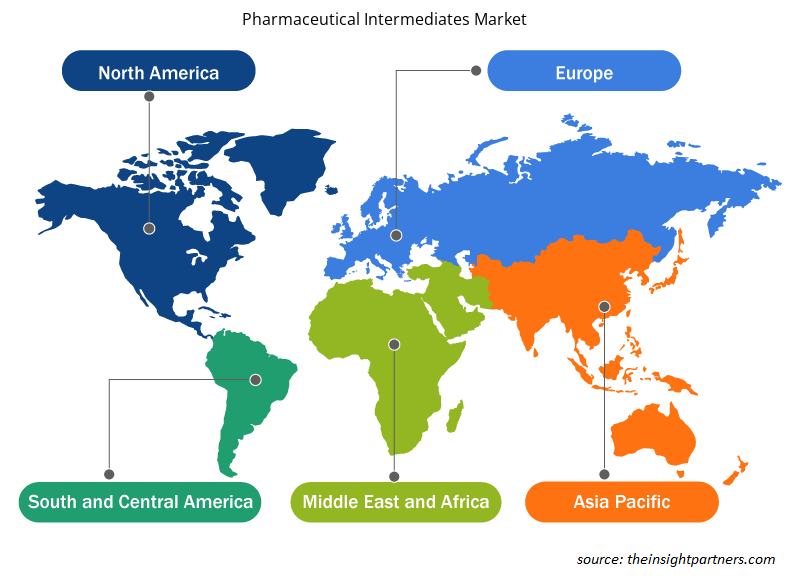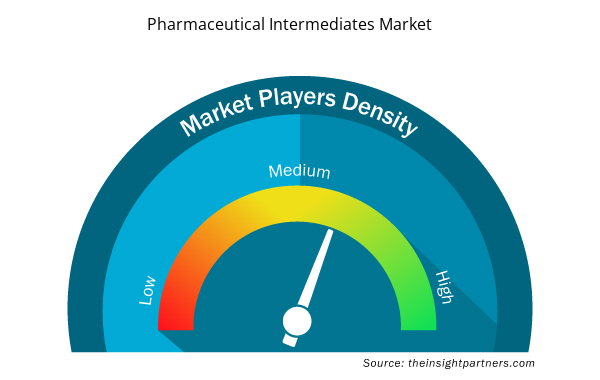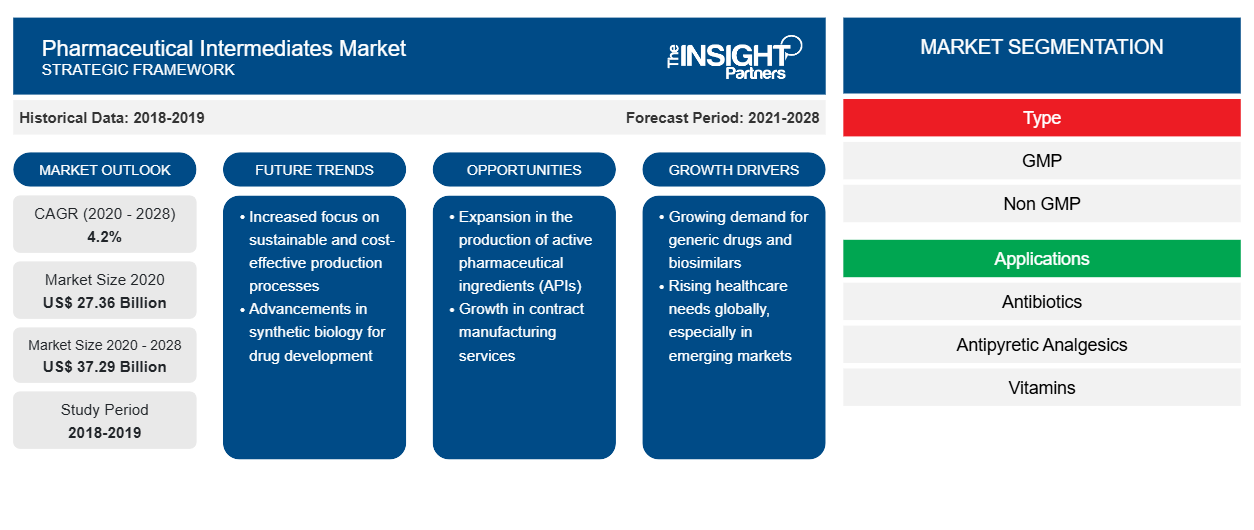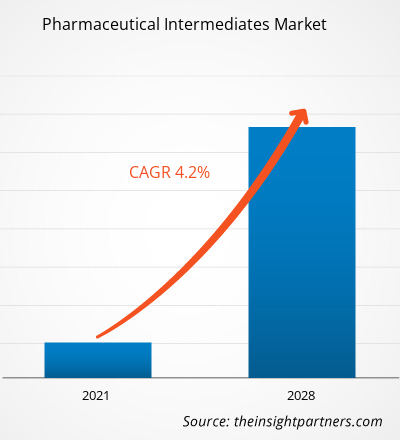من المتوقع أن يصل سوق الوسائط الصيدلانية إلى 37،290.33 مليون دولار أمريكي في عام 2028 من 27،356.70 مليون دولار أمريكي في عام 2020. ومن المتوقع أن ينمو السوق بمعدل نمو سنوي مركب قدره 4.2٪ من 2021 إلى 2028.
تم تحليل سوق المواد الوسيطة الصيدلانية على أساس النوع والتطبيق وقناة التوزيع والمنطقة. يتم تقسيم السوق على أساس المنطقة إلى أمريكا الشمالية وأوروبا وآسيا والمحيط الهادئ والشرق الأوسط وأفريقيا وأمريكا الجنوبية والوسطى. يركز التقرير على معايير مثل اتجاهات السوق والتقدم التكنولوجي وديناميكيات السوق وتحليل المشهد التنافسي للشركة الرائدة لتقديم رؤى وتحليل متعمق لسوق المواد الوسيطة الصيدلانية. كما يتضمن تحليل جائحة COVID-19 عبر السوق في جميع المناطق الرئيسية.
قم بتخصيص هذا التقرير ليناسب متطلباتك
ستحصل على تخصيص لأي تقرير - مجانًا - بما في ذلك أجزاء من هذا التقرير، أو تحليل على مستوى الدولة، وحزمة بيانات Excel، بالإضافة إلى الاستفادة من العروض والخصومات الرائعة للشركات الناشئة والجامعات
- احصل على أهم اتجاهات السوق الرئيسية لهذا التقرير.ستتضمن هذه العينة المجانية تحليلاً للبيانات، بدءًا من اتجاهات السوق وحتى التقديرات والتوقعات.
رؤى السوق
ارتفاع معدل انتشار الأمراض المزمنة والأمراض المعدية
تعتبر المواد الوسيطة الصيدلانية اللبنات الأساسية للمكونات الصيدلانية النشطة (APIs). وهي عبارة عن مواد خام تخضع للتغيير الجزيئي أو المعالجة أثناء إنتاج الأدوية بكميات كبيرة. وبالتالي، يزداد الطلب على المواد الوسيطة الصيدلانية مع ارتفاع الطلب على الأدوية لعلاج الأمراض المزمنة. وفقًا لمراكز السيطرة على الأمراض والوقاية منها (CDC)، يعاني 6 من كل 10 بالغين في الولايات المتحدة من مرض مزمن واحد على الأقل مثل السرطان وأمراض القلب وأمراض الرئة والسكتة الدماغية والأمراض العصبية والسكري وأمراض الكلى. علاوة على ذلك، يعاني 4 من كل 10 بالغين في البلاد من مرضين مزمنين أو أكثر. بالإضافة إلى ذلك، وفقًا للبيان الصحفي الصادر عن التحالف الأوروبي للأمراض المزمنة (ECDA)، في عام 2014، يموت 9 من كل 10 أشخاص في أوروبا بسبب الأمراض المزمنة. وبالتالي، يتم إنفاق 70-80٪ من إجمالي تكاليف الرعاية الصحية على إدارة الأمراض المزمنة.
ومن المرجح أيضًا أن يؤدي الانتشار المتزايد للأمراض المعدية، وخاصة في جنوب شرق آسيا، إلى زيادة الطلب على المواد الفعالة الصيدلانية في السنوات القادمة، مما يؤدي في النهاية إلى نمو سوق المواد الوسيطة الصيدلانية. على سبيل المثال، وفقًا لتقرير برنامج مكافحة السل الوطني المنقح، توفي حوالي 4.4 مليون مريض بسبب مرض السل في الهند في عام 2018، أي 29٪ من إجمالي 1.5 مليون حالة وفاة ناجمة عن المرض في جميع أنحاء العالم. وبالتالي، فإن هذا الانتشار المرتفع للأمراض المزمنة والأمراض المعدية يعزز الطلب على الأدوية، مما يسلط الضوء في النهاية على الحاجة إلى المواد الوسيطة الصيدلانية.
رؤى مبنية على النوع
ينقسم سوق المنتجات الوسيطة الصيدلانية ، حسب النوع، إلى منتجات خاضعة لممارسات التصنيع الجيدة ومنتجات غير خاضعة لممارسات التصنيع الجيدة. وقد استحوذ قطاع المنتجات الخاضعة لممارسات التصنيع الجيدة على الحصة الأكبر من السوق في عام 2020، في حين من المتوقع أن يسجل نفس القطاع أعلى معدل نمو سنوي مركب بنسبة 4.4% في السوق خلال الفترة المتوقعة.
رؤى قائمة على التطبيق
ينقسم سوق المواد الوسيطة الصيدلانية، حسب التطبيق، إلى المضادات الحيوية ومسكنات الآلام الخافضة للحرارة والفيتامينات وغيرها. وقد استحوذ قطاع المضادات الحيوية على الحصة الأكبر من السوق في عام 2020، ومن المتوقع أيضًا أن يسجل هذا القطاع أعلى معدل نمو سنوي مركب بنسبة 4.9% في السوق خلال الفترة المتوقعة.
رؤى تعتمد على قنوات التوزيع
على أساس قناة التوزيع، تم تقسيم سوق المواد الوسيطة الصيدلانية إلى موزع ومبيعات مباشرة. استحوذ قطاع المبيعات المباشرة على أكبر حصة من السوق في عام 2020، ومن المتوقع أن يسجل قطاع الموزع أعلى معدل نمو سنوي مركب بنسبة 4.2٪ في السوق خلال الفترة المتوقعة.
تتبنى الشركات العاملة في سوق المنتجات الوسيطة الصيدلانية استراتيجيات عضوية مثل إطلاق المنتجات والتوسع لتوسيع نطاق وجودها ومحفظة منتجاتها في جميع أنحاء العالم بالإضافة إلى تلبية الطلبات المتزايدة.
رؤى إقليمية حول سوق المواد الوسيطة الصيدلانية
لقد قام المحللون في Insight Partners بشرح الاتجاهات والعوامل الإقليمية المؤثرة على سوق الوسيطات الصيدلانية طوال فترة التوقعات بشكل شامل. يناقش هذا القسم أيضًا قطاعات سوق الوسيطات الصيدلانية والجغرافيا في جميع أنحاء أمريكا الشمالية وأوروبا ومنطقة آسيا والمحيط الهادئ والشرق الأوسط وأفريقيا وأمريكا الجنوبية والوسطى.

- احصل على البيانات الإقليمية المحددة لسوق المواد الوسيطة الصيدلانية
نطاق تقرير سوق الوسيطات الصيدلانية
| سمة التقرير | تفاصيل |
|---|---|
| حجم السوق في عام 2020 | 27.36 مليار دولار أمريكي |
| حجم السوق بحلول عام 2028 | 37.29 مليار دولار أمريكي |
| معدل النمو السنوي المركب العالمي (2020 - 2028) | 4.2% |
| البيانات التاريخية | 2018-2019 |
| فترة التنبؤ | 2021-2028 |
| القطاعات المغطاة | حسب النوع
|
| المناطق والدول المغطاة | أمريكا الشمالية
|
| قادة السوق وملفات تعريف الشركات الرئيسية |
|
كثافة اللاعبين في سوق المواد الوسيطة الصيدلانية: فهم تأثيرها على ديناميكيات الأعمال
يشهد سوق المواد الوسيطة الصيدلانية نموًا سريعًا، مدفوعًا بالطلب المتزايد من المستخدم النهائي بسبب عوامل مثل تفضيلات المستهلكين المتطورة والتقدم التكنولوجي والوعي المتزايد بفوائد المنتج. ومع ارتفاع الطلب، تعمل الشركات على توسيع عروضها والابتكار لتلبية احتياجات المستهلكين والاستفادة من الاتجاهات الناشئة، مما يؤدي إلى زيادة نمو السوق.
تشير كثافة اللاعبين في السوق إلى توزيع الشركات أو المؤسسات العاملة في سوق أو صناعة معينة. وهي تشير إلى عدد المنافسين (اللاعبين في السوق) الموجودين في مساحة سوق معينة نسبة إلى حجمها أو قيمتها السوقية الإجمالية.
الشركات الرئيسية العاملة في سوق المستحضرات الصيدلانية هي:
- شركة فايزر
- سانوفي
- باسف اس اي
- شركة ليانهي للتكنولوجيا الكيميائية المحدودة
- ديشمان كاربوجين أمسيس المحدودة
إخلاء المسؤولية : الشركات المذكورة أعلاه ليست مرتبة بأي ترتيب معين.

- احصل على نظرة عامة على أهم اللاعبين الرئيسيين في سوق المواد الوسيطة الصيدلانية
حسب النوع
- ممارسات التصنيع الجيدة
- غير خاضع لممارسات التصنيع الجيدة
حسب الطلب
- المضادات الحيوية
- مسكنات خافضة للحرارة
- الفيتامينات
- آحرون
حسب قناة التوزيع
- موزع
- المبيعات المباشرة
حسب الجغرافيا
أمريكا الشمالية
- نحن
- كندا
- المكسيك
أوروبا
- ألمانيا
- فرنسا
- إيطاليا
- المملكة المتحدة
- إسبانيا
- سويسرا
- بلجيكا
- اليونان
- النرويج
- البرتغال
- السويد
- الجمهورية التشيكية
- كرواتيا
- أيرلندا
- الدنمارك
- هولندا
- روسيا
- بقية أوروبا
آسيا والمحيط الهادئ (APAC)
- الصين
- الهند
- كوريا الجنوبية
- اليابان
- أستراليا
- بقية منطقة آسيا والمحيط الهادئ
الشرق الأوسط وأفريقيا
- جنوب أفريقيا
- المملكة العربية السعودية
- الامارات العربية المتحدة
- ديك رومى
- باقي منطقة الشرق الأوسط وأفريقيا
أمريكا الجنوبية والوسطى (SCAM)
- البرازيل
- الأرجنتين
- بقية الاحتيال
نبذة عن الشركة
- شركة فايزر
- مجموعة ديشمان
- مختبرات دكستر المحدودة
- شركة سانوفي وينثروب للصناعات المحدودة
- شركة فيرتليس القابضة المحدودة
- باسف اس اي
- ليانهيتك
- كوديكسس
- شركة ميداس فارما المحدودة
- شركة شيراكون المحدودة
- التحليل التاريخي (سنتان)، السنة الأساسية، التوقعات (7 سنوات) مع معدل النمو السنوي المركب
- تحليل PEST و SWOT
- حجم السوق والقيمة / الحجم - عالميًا وإقليميًا وقطريًا
- الصناعة والمنافسة
- مجموعة بيانات Excel



Report Coverage
Revenue forecast, Company Analysis, Industry landscape, Growth factors, and Trends

Segment Covered
This text is related
to segments covered.

Regional Scope
North America, Europe, Asia Pacific, Middle East & Africa, South & Central America

Country Scope
This text is related
to country scope.
الأسئلة الشائعة
The costs of the Pharmaceutical Intermediates are much higher, and they may cost US$ 5–50, or more, per kgs. The cost may also differ from product to product types.
Pharmaceutical intermediates are the raw materials used to manufacture active pharmaceutical ingredients for the final drug formulation. Pharmaceutical intermediates are used in the production of bulk drugs as well as for research and development purpose by various pharm and biopharma companies. Pharmaceutical intermediates are formed at the time of process of production or synthesis of active pharmaceutical ingredients.
Key factors that are driving the market are to rising prevalence of chronic diseases and infectious diseases, and escalating investment by pharmaceutical companies in R&D activities. However, high cost of drug manufacturing hinders the market growth.
The List of Companies - Pharmaceutical Intermediate Market
- Pfizer Inc.
- Sanofi
- BASF SE
- Lianhe Chemical Technology Co., Ltd
- Dishman Carbogen Amcis Ltd
- Codexis
- Midas Pharma GmbH
- chiracon GmbH
- Dextra Laboratories Limited
- Vertellus Holdings LLC
The Insight Partners performs research in 4 major stages: Data Collection & Secondary Research, Primary Research, Data Analysis and Data Triangulation & Final Review.
- Data Collection and Secondary Research:
As a market research and consulting firm operating from a decade, we have published and advised several client across the globe. First step for any study will start with an assessment of currently available data and insights from existing reports. Further, historical and current market information is collected from Investor Presentations, Annual Reports, SEC Filings, etc., and other information related to company’s performance and market positioning are gathered from Paid Databases (Factiva, Hoovers, and Reuters) and various other publications available in public domain.
Several associations trade associates, technical forums, institutes, societies and organization are accessed to gain technical as well as market related insights through their publications such as research papers, blogs and press releases related to the studies are referred to get cues about the market. Further, white papers, journals, magazines, and other news articles published in last 3 years are scrutinized and analyzed to understand the current market trends.
- Primary Research:
The primarily interview analysis comprise of data obtained from industry participants interview and answers to survey questions gathered by in-house primary team.
For primary research, interviews are conducted with industry experts/CEOs/Marketing Managers/VPs/Subject Matter Experts from both demand and supply side to get a 360-degree view of the market. The primary team conducts several interviews based on the complexity of the markets to understand the various market trends and dynamics which makes research more credible and precise.
A typical research interview fulfils the following functions:
- Provides first-hand information on the market size, market trends, growth trends, competitive landscape, and outlook
- Validates and strengthens in-house secondary research findings
- Develops the analysis team’s expertise and market understanding
Primary research involves email interactions and telephone interviews for each market, category, segment, and sub-segment across geographies. The participants who typically take part in such a process include, but are not limited to:
- Industry participants: VPs, business development managers, market intelligence managers and national sales managers
- Outside experts: Valuation experts, research analysts and key opinion leaders specializing in the electronics and semiconductor industry.
Below is the breakup of our primary respondents by company, designation, and region:

Once we receive the confirmation from primary research sources or primary respondents, we finalize the base year market estimation and forecast the data as per the macroeconomic and microeconomic factors assessed during data collection.
- Data Analysis:
Once data is validated through both secondary as well as primary respondents, we finalize the market estimations by hypothesis formulation and factor analysis at regional and country level.
- Macro-Economic Factor Analysis:
We analyse macroeconomic indicators such the gross domestic product (GDP), increase in the demand for goods and services across industries, technological advancement, regional economic growth, governmental policies, the influence of COVID-19, PEST analysis, and other aspects. This analysis aids in setting benchmarks for various nations/regions and approximating market splits. Additionally, the general trend of the aforementioned components aid in determining the market's development possibilities.
- Country Level Data:
Various factors that are especially aligned to the country are taken into account to determine the market size for a certain area and country, including the presence of vendors, such as headquarters and offices, the country's GDP, demand patterns, and industry growth. To comprehend the market dynamics for the nation, a number of growth variables, inhibitors, application areas, and current market trends are researched. The aforementioned elements aid in determining the country's overall market's growth potential.
- Company Profile:
The “Table of Contents” is formulated by listing and analyzing more than 25 - 30 companies operating in the market ecosystem across geographies. However, we profile only 10 companies as a standard practice in our syndicate reports. These 10 companies comprise leading, emerging, and regional players. Nonetheless, our analysis is not restricted to the 10 listed companies, we also analyze other companies present in the market to develop a holistic view and understand the prevailing trends. The “Company Profiles” section in the report covers key facts, business description, products & services, financial information, SWOT analysis, and key developments. The financial information presented is extracted from the annual reports and official documents of the publicly listed companies. Upon collecting the information for the sections of respective companies, we verify them via various primary sources and then compile the data in respective company profiles. The company level information helps us in deriving the base number as well as in forecasting the market size.
- Developing Base Number:
Aggregation of sales statistics (2020-2022) and macro-economic factor, and other secondary and primary research insights are utilized to arrive at base number and related market shares for 2022. The data gaps are identified in this step and relevant market data is analyzed, collected from paid primary interviews or databases. On finalizing the base year market size, forecasts are developed on the basis of macro-economic, industry and market growth factors and company level analysis.
- Data Triangulation and Final Review:
The market findings and base year market size calculations are validated from supply as well as demand side. Demand side validations are based on macro-economic factor analysis and benchmarks for respective regions and countries. In case of supply side validations, revenues of major companies are estimated (in case not available) based on industry benchmark, approximate number of employees, product portfolio, and primary interviews revenues are gathered. Further revenue from target product/service segment is assessed to avoid overshooting of market statistics. In case of heavy deviations between supply and demand side values, all thes steps are repeated to achieve synchronization.
We follow an iterative model, wherein we share our research findings with Subject Matter Experts (SME’s) and Key Opinion Leaders (KOLs) until consensus view of the market is not formulated – this model negates any drastic deviation in the opinions of experts. Only validated and universally acceptable research findings are quoted in our reports.
We have important check points that we use to validate our research findings – which we call – data triangulation, where we validate the information, we generate from secondary sources with primary interviews and then we re-validate with our internal data bases and Subject matter experts. This comprehensive model enables us to deliver high quality, reliable data in shortest possible time.


 احصل على عينة مجانية لهذا التقرير
احصل على عينة مجانية لهذا التقرير